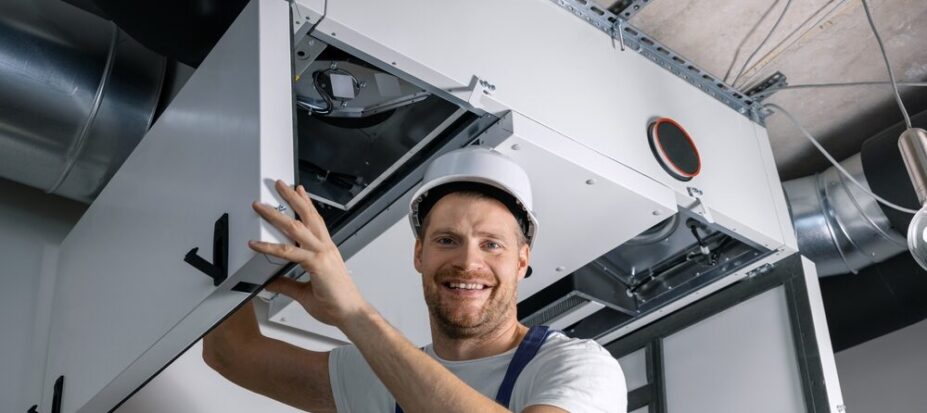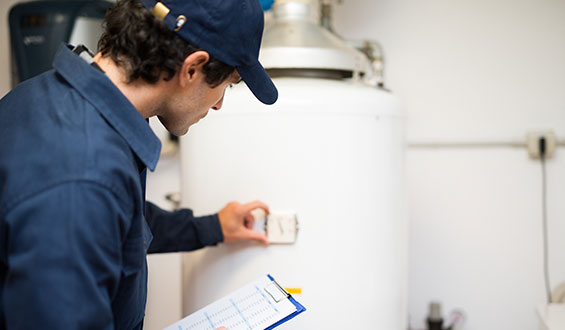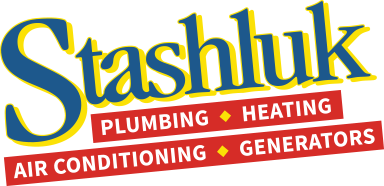Replacing an old or failing heating system is a significant project for homeowners in New Jersey, especially during the bitter winter months. Done correctly, New Jersey HVAC contractors can accomplish a heating system replacement efficiently and cost-effectively with minimal disruption.
These five steps will guide you through the replacement process, from deciding what heating system suits your home to ensuring proper installation and maintenance. By following these recommendations from heating experts, New Jersey homeowners can gain peace of mind, knowing their new heating system will work efficiently for years to come.
Don’t let HVAC issues leave your New Jersey home cold this winter. Contact E.J. Stashluk & Sons Inc. at 908.277.6200 immediately to schedule expert furnace repair and ongoing maintenance services that keep your family warm and safe all season.



Reasons to Replace Your Heating System
You can invest in New Jersey HVAC contractors to replace your home’s heating system for many good reasons. Some of the most common reasons include:
Frequent Repairs and Breakdowns
Suppose your current heating system requires frequent, costly repairs or suffers intermittent breakdowns. In that case, this is a vital sign it’s time for a furnace contractor to inspect and potentially replace it. Continually repairing an aging or faulty system will likely cost more in the long run than installing a new replacement heating system.
High Energy Bills and Inefficiency
Inefficient heating systems force your home’s HVAC system to work harder than needed, jacking up monthly energy bills. Outdated systems can waste 30% or more of their energy by losing heat through duct leaks and poor insulation. Upgrading to a modern high-efficiency heating system can pay for itself over a few years through utility bill savings.
Obsolete Parts and Components
Some older systems rely on outdated components, refrigerants, and technology that are difficult to service and maintain. Parts and skilled technicians for obsolete systems are harder to find. To avoid expensive headaches in the future, have your heating system inspected by New Jersey HVAC contractors to see if replacement makes sense.
Step 1: Choose the Right System
The most critical step when planning heating system replacement is selecting the type best suited for your home. Key factors include available fuels, efficiency ratings, space requirements, installation and equipment costs, HVAC system compatibility, and long-term owning and operating costs.
New Jersey HVAC contractors will evaluate your home and advise you on heating system options that make the most sense based on your situation. They will also handle proper sizing calculations to ensure your new system meets your home’s heating demands.
Ordinary, typical system replacement options include:
Gas Furnaces
Gas furnaces are the most popular choice for heating system replacement in New Jersey homes. Models achieving AFUE efficiency ratings above 90% transform nearly all the natural gas or propane they consume into usable heat. Modern variable-speed and modulating gas furnaces carefully regulate heating output as conditions change to prevent temperature fluctuations. Their relatively low equipment and installation costs make high-efficiency gas furnaces an affordable and effective option.
Heat Pumps
While more costly upfront, electric air-source and geothermal heat pumps can provide highly high-quality supplemental or complete home heating. Using advanced inverter technology, variable capacity heat pumps automatically adjust heating output to match real-time demand. Air-source heat pumps extract ambient heat from cold outside air, concentrating it to warm your home. Geothermal systems harness heat absorbed by the earth. Heat pumps can achieve efficiency ratings over 300%, providing up to three times more heat energy than electricity consumption. Their technology does require professional installation and service from qualified New Jersey HVAC contractors to realize such high efficiencies and proper performance.
Electric Furnaces
As their name implies, electric furnaces employ electric heating elements instead of gas combustion to generate warm air. They plug into standard electrical outlets without requiring fuel lines or exhaust venting. Electric furnaces cost more to operate long-term but avoid the need to store and handle heating fuels. While less complex than heat pumps, their overall efficiency in converting electricity into heat still needs to be higher.
Step 2: Proper Sizing and Installation
The next critical step is for New Jersey HVAC contractors to properly size and install your new equipment to the exact specifications. Only a licensed, professional HVAC technician has the tools, skills, and experience to calculate the required heating capacity and select equipment accordingly. Force-fitting oversized or undersized heating equipment leads to system imbalance and inefficiency. Sloppy duct connections and improper airflow adjustments also waste energy. Leave the heating system sizing, selection, permitting, and installation to qualified New Jersey HVAC contractors. Paying extra for precision sizing and artistry saves substantially on operating costs over decades of future use.
Some key installation factors influencing heating system efficiency include:
-
Precisely modeling and airflow dynamics
-
Tight, well-insulated duct connections
-
Sealing and insulating return air paths
-
Adjusting equipment airflow for your home’s static pressure
-
Integrating advanced “smart” thermostatic controls
New Jersey HVAC contractors ensure all these variables receive proper attention during installation and start-up to maximize your heating system’s useful life and efficiency.
Step 3: Combine Upgrades for Maximum Savings
Heating equipment does not operate in isolation. How well your heating system performs depends partially on your home’s insulation, air sealing, windows, thermostat settings, and other interacting components.
Bundling heating system replacement with envelope upgrades amplifies energy savings further. Standard standardly-boosting upgrades allowing upgraded heating systems to perform at their peak include:
Increase Insulation
Adding insulation to under-insulated attics, basements, crawlspaces, and exposed walls dramatically cuts heating and cooling costs. Adequate insulation slows heat loss and reduces duct leaks. High-performance fiberglass batt or loose-fill insulation achieves an R-value around R-38 in New Jersey attics. Rigid foam sheathing insulates basement foundation walls and rim joists. Quality caulking and weatherstripping around windows, doors, and attic hatches prevent precious conditioned air from escaping.
Improve Air Sealing
Cracks, gaps, and leaky joints allow heated indoor air to escape while letting cold outside air infiltrate. New Jersey HVAC contractors methodically seal all hidden air leakage pathways during heating system replacement projects using caulk, spray foam, and weatherstripping. Typical trouble spots include attics, crawl spaces, ducts, windows, recessed lights, plumbing penetrations, fireplaces, attic hatches, sill plates, and electrical outlets. Careful air sealing avoids wasted energy and allows right-sized heating equipment to keep interior conditions comfortable.
Combining heating system replacement with insulation upgrades and whole-house air sealing provides an opportunity to maximize energy savings in one coordinated project managed by your New Jersey HVAC contractors.
Step 4: Proper Maintenance Is Vital
No heating system, regardless of how advanced or efficiently designed, operates at its best without periodic maintenance. Just like changing the oil in your car at scheduled intervals, heating equipment needs regular upkeep and cleaning to sustain peak performance year after year.
New Jersey HVAC contractors typically offer preventative maintenance agreements tailored to your specific heating equipment. HVAC maintenance technicians methodically inspect, test, adjust, lubricate, and clean all heating components to keep them operating reliably at design efficiency. Refrigerant levels, electrical terminals, fuel systems, motors, airflow, combustion performance, and safety controls all need periodic attention from qualified technicians. Maintenance contracts also include priority service and discounted repairs should problems arise between visits.
Regular maintenance from New Jersey HVAC contractors gives homeowners confidence their heating investment will continue delivering comfort and savings for its entire service life.
Step 5: Know When To Call A Professional
While monthly filter changes and clearing debris away from outdoor condenser coils fall within DIY territory, heating system repairs, and troubleshooting should be left to experienced New Jersey HVAC contractors. Warning signs indicating a service call is needed include:
-
Uncomfortable temperature fluctuations
-
Strange new noises or vibrations
-
Burning smells or very high equipment surface temperatures
-
Visible sparks, flames, or smoke,e
-
Frost or ice buildup on refrigerant lines or ductwork
-
Significant increases in monthly energy bills
-
Frequent cycling on and off
-
Circuit breakers trips or blown fuses
If the inspection reveals refrigerant leaks, dangerous carbon monoxide accumulation, malfunctioning gas valves, electrical issues, or combustion venting problems, evacuate everyone from home immediately and contact New Jersey HVAC contractors.
Only NATE-certified, licensed HVAC technicians have the specialized tools, skills, and expertise to diagnose problems properly. They ensure heating equipment repairs adhere to local building codes and safety standards. DIY attempts often miss underlying issues and void manufacturer warranties. New Jersey HVAC contractors get heating systems back up and running correctly the first time.
Heating System Replacement FAQs
Do you still have questions about upgrading home heating equipment in New Jersey? These frequently asked questions provide more details:
-
How Much Does It Cost To Replace A Furnace In New Jersey?
Furnace replacement costs range widely in New Jersey depending on the system type, brand, size, and efficiency. However, homeowners generally pay between $4,000 and $12,000 for New Jersey HVAC contractors to replace an existing gas furnace with a new high-efficiency model, including installation. Bundled efficiency upgrades add $5,000 or more to the total project investment.
-
When Should You Replace A 20-Year-Old Furnace?
While a 20-year-old natural gas furnace may continue providing sufficient heating, its advanced age means components wear out faster while efficiency declines. Monthly energy bills for an aging furnace often run higher than replacing it early with a modern high-efficiency heating system. Many New Jersey HVAC contractors recommend upgrading furnaces older than 15-20 years to save substantially on heating costs moving forward.
-
Is It Worth Replacing A 10-Year-Old Furnace?
Replacing a furnace aged 10-15 years falls into a grey zone requiring weighing factors like maintenance costs, efficiency ratings, repair histories, and changing needs. Have your existing furnace thoroughly inspected by New Jersey HVAC contractors before deciding. If the current system remains in good shape and sufficiently meets household heating demand, it may have 5-10 more useful valuable ft. Otherwise, replacement now locks in energy savings from advanced new technology.
-
Should I Get Quotes From Multiple HVAC Contractors In New Jersey?
Shopping among at least 3-5 New Jersey HVAC contractors helps homeowners compare fair market pricing and available options when replacing home heating systems. Just as crucial as apples-to-apples bid comparisons are verifying each contractor’s licensing, insurance coverage, local reputation, warranties, and service capabilities before signing a contract. Priority should go to HVAC replacement quotes clearly outlining the complete scope of work required.
-
How Can I Finance New Heating System Replacement Costs?
Many homeowners finance major heating system replacement projects through home equity loans and lines of credit, offering competitive interest rates and flexible repayment terms. New Jersey HVAC contractors may also provide provident financing packages tailored to HVAC installation. Utility company rebates, manufacturer discounts, and tax credits help offset overall replacement costs further. Contact multiple lenders to find the best rates and terms.
Request Same-Day NJ Heating System Repairs
Replacing outdated or inefficient home heating systems pays dividends in New Jersey through enhanced comfort, lower energy bills, reduced repairs, and improved resale value. Following these best practice recommendations and letting qualified New Jersey HVAC contractors guide the process, homeowners can expect years of worry-free warmth and savings from upgraded high-efficiency heating equipment fine-tuned for their home’s needs.
Don’t wait until your family is freezing in your home to call for furnace help. At the first sign of cold spots, high energy bills, strange smells, or error codes, phone our team immediately at 908.277.6200. We’ll dispatch our licensed heating experts to diagnose issues when you contact us. We carry replacement parts in our vehicle stock to restore comforting warmth quickly. You can count on us 24/7 for same-day repairs.





